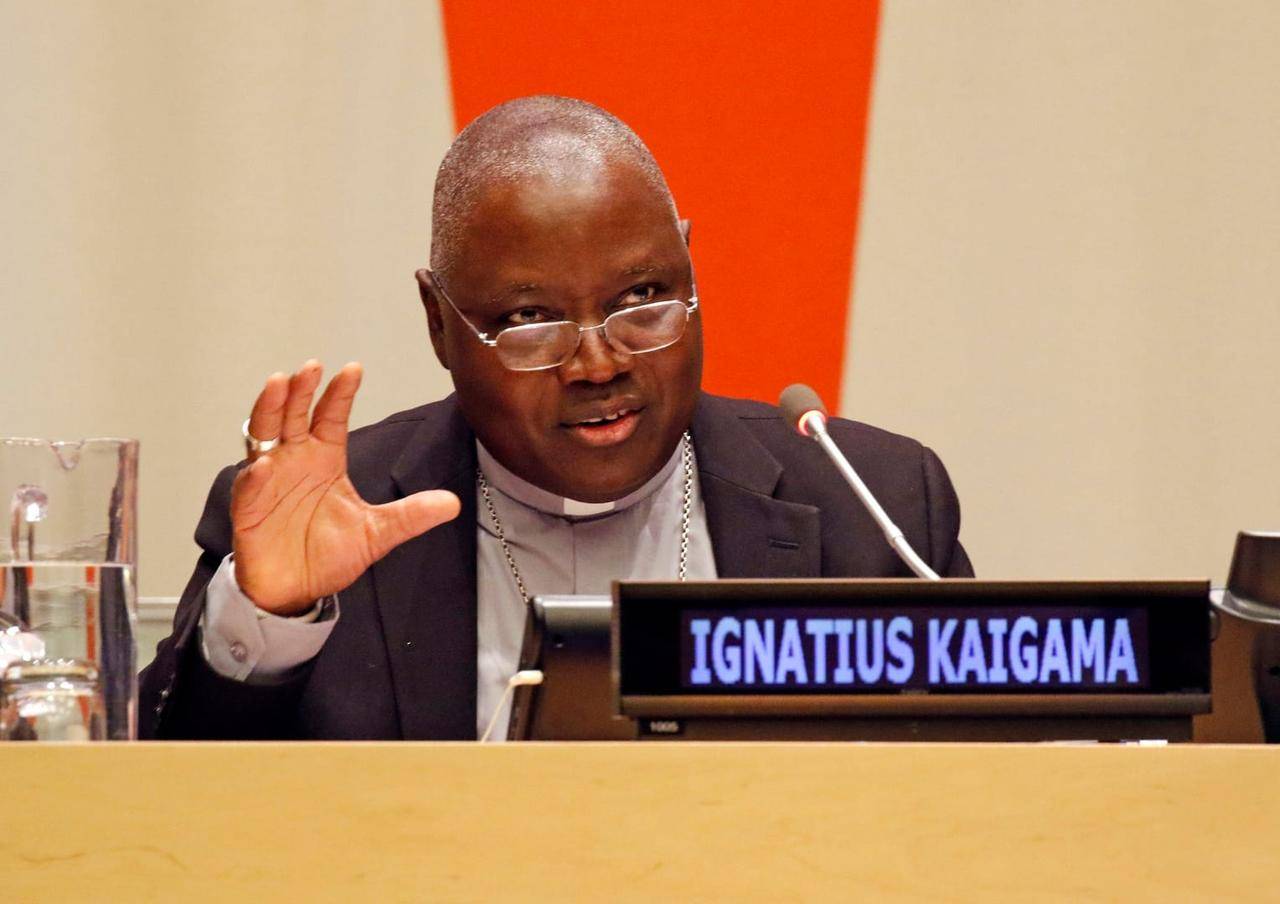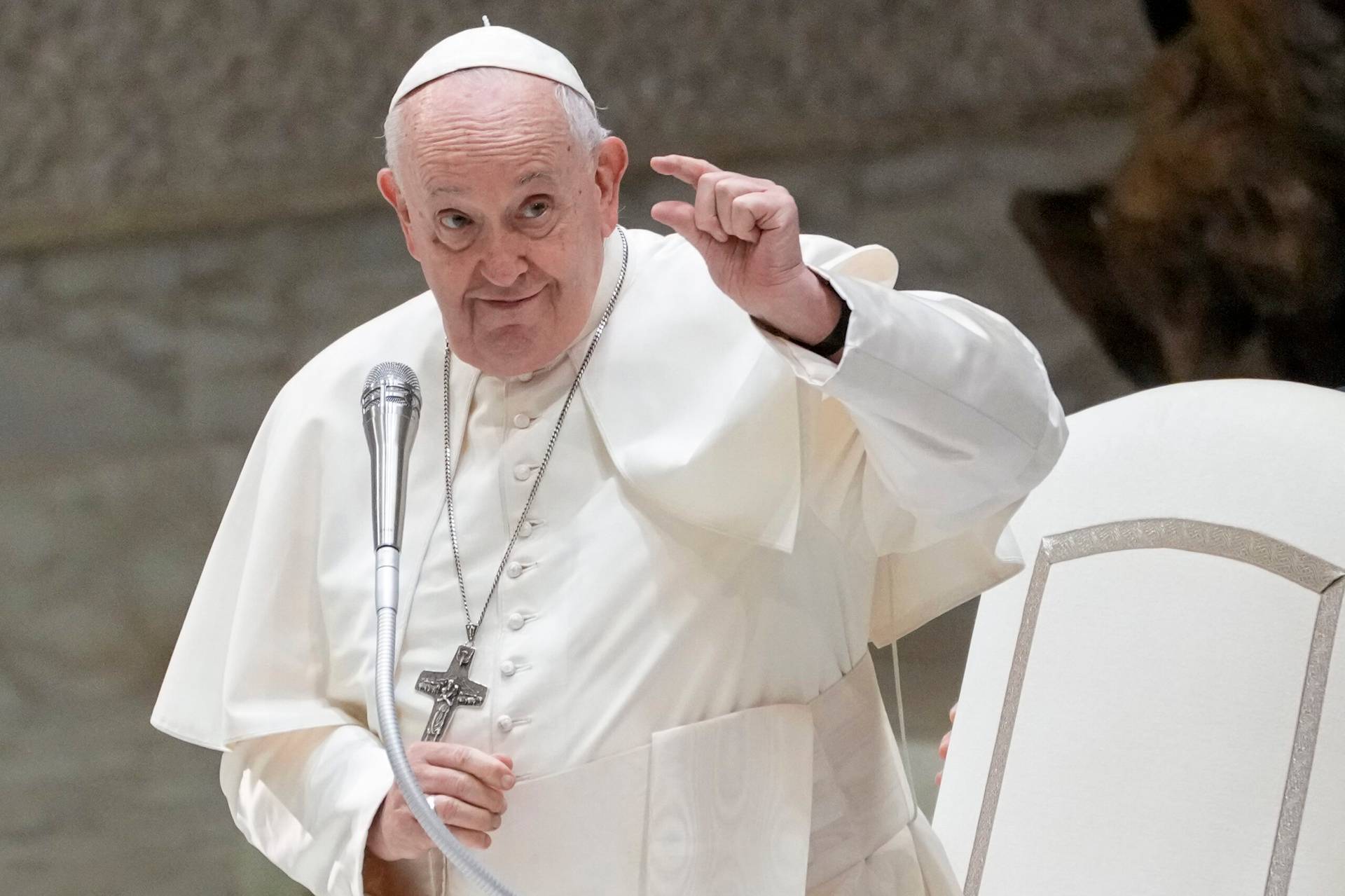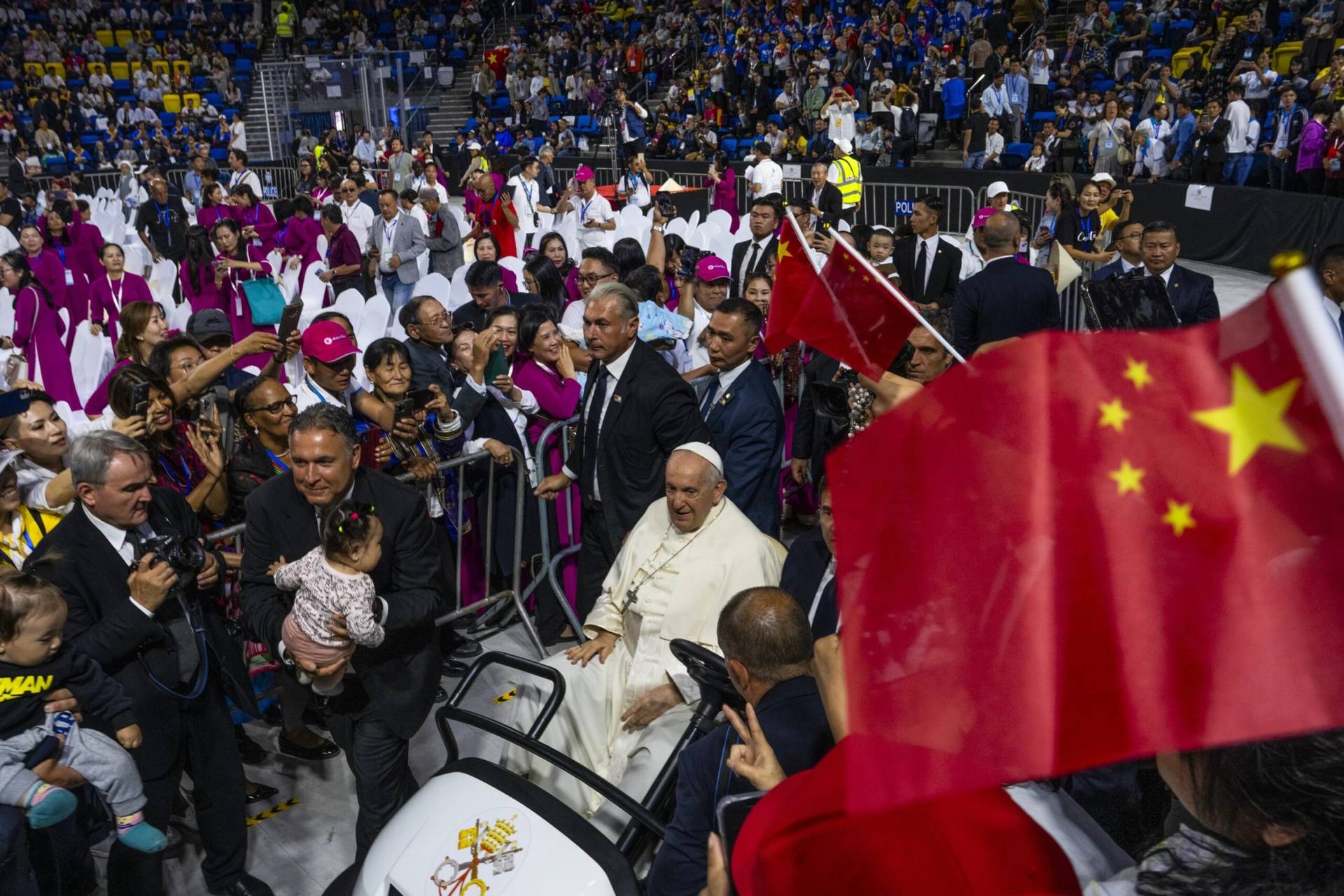ULAANBAATAR – On his second full day in Mongolia, Pope Francis met with pastors and missionaries who serve the country’s tiny Catholic flock, telling them not to be concerned with numbers and that God loves littleness.
He also spoke at length of the Catholic Church’s contribution to social initiatives and the spread of values such as solidarity and human fraternity, insisting that governments have nothing to fear from the Church or its representatives.
In his Sept. 2 speech, the pope noted that the famed Marian statue of Our Lady of Heaven in Mongolia, which is housed in the Cathedral of Sts. Peter and Paul in Ulaanbaatar where Saturday’s event took place, was found in a landfill.
Invoking the special significance that mothers hold in Mongolian society, he said the location of where the statue was found was “a tangible sign” of Mary’s “gentle and caring presence.”
“In a place for refuse, this beautiful statue of the Immaculate Mother appeared. Herself free and undefiled by sin, she wanted to draw so close to us as to descend to the dregs of society, so that from the filth of a rubbish heap the purity of the holy Mother of God could shine forth,” he said.
Tradition holds that a Buddhist woman named Tsetsegee found the statue, which Pope Francis blessed Saturday, in a landfill in Darkhan nearly 20 years ago, before missionaries had arrived in the area. She eventually donated the statue to Catholic missionaries, and it was enthroned in Ulaanbaatar’s Cathedral of Sts. Peter and Paul by the current apostolic prefect, Cardinal Giorgio Marengo, in December 2022.
Mary, the pope said, offers the assurance that “being little is not a problem, but a resource,” and that “God loves littleness, and through it he loves to accomplish great things.”
“Brothers and sisters do not be concerned about small numbers, limited success, or apparent irrelevance. That is not how God works,” he said, urging Mongolian Catholics to entrust themselves to Mary’s care, “asking for a renewed zeal and an ardent love that tirelessly and joyfully bears witness to the Gospel.”
Pope Francis arrived in Ulaanbaatar Sept. 1, making him the first pope to set foot in Mongolia, a majority Buddhist nation whose expansive nomadic lands are sandwiched between Russia and China, giving the pope’s visit both clear geopolitical and pastoral tones.
Catholics in Mongolia are a small minority, numbering fewer than 1,500 in a country that is roughly 53 percent Buddhist, with most adhering to Tibetan Buddhism, and where suspicion of outside religious influences is still bubbling beneath the surface of the former Communist nation.
After the dissolution of Soviet rule in 1992, religious freedom in Mongolia was restored and the country again began embracing new religious traditions, including Catholicism, with the first modern missionaries arriving immediately after the fall of communism.
However, despite the generally good relations between Church and state, some troubles still exist, particularly on the issue of visas and navigating state involvement when new parishes or Church-related sites are established.
Oftentimes foreign missionaries in Mongolia, no matter how long they’ve lived there or how well they speak the language, receive only short-term visas, meaning they are forced to travel abroad every three months without having the certainty of whether they will be allowed back in.
According to a recent article published in The Diplomat, the Mongolia government also requests that for every missionary visa granted, Catholic entities pay certain fees and employ a number of local citizens.
Vatican spokesman Matteo Bruni told Crux Saturday that the situation is currently the subject of bilateral talks.
“Negotiations are in progress, it should be on the status of the Church and visas for missionaries,” he said.
In his address to authorities earlier Saturday morning, Pope Francis also made reference to a deal being in the works, saying, a bilateral agreement between Mongolia and the Holy See is being negotiated which marks “an important means for the attainment of those conditions essential for the pursuit of the ordinary activities in which the Catholic Church is engaged.”
To clergy, the pope praised missionaries for spending their lives spreading “the joy of the Gospel,” and outlined this history of missionary activity in the country, saying the primary reason to spend one’s life sharing the Gospel with others is because they themselves have “tasted, savored, experienced” God’s love.
“Jesus is the good news, meant for all peoples, the message that the Church must constantly proclaim, embody in her life and ‘whisper’ to the heart of every individual and all cultures,” he said, alluding to the special place silence and interiority hold in Mongolian culture.
He highlighted the Church’s various social initiatives in Mongolia, which include agricultural programs aimed at introducing greenhouses in private homes to curb poverty and malnutrition, as well as kindergartens and support programs for women facing domestic violence and their children.
The Church also assists migrants and helps siphon funds from foreign aid to various local initiatives, with most beneficiaries being non-Catholic, while also promoting both anti-discrimination and anti-corruption efforts.
Pope Francis said that by sending his disciples into the world, Jesus “did not send them to spread political theories, but to bear witness by their lives to the newness of his relationship with his Father… which is the source of concrete fraternity with every individual and people.”
“The Church born of that mandate is a poor Church, sustained only by genuine faith and by the unarmed and disarming power of the Risen Lord, and capable of alleviating the sufferings of wounded humanity,” he said.
For this reason, Francis insisted that “governments and secular institutions have nothing to fear from the Church’s work of evangelization, for she has no political agenda to advance, but is sustained by the quiet power of God’s grace and a message of mercy and truth, which is meant to promote the good of all.”
The “calling card” of a missionary, he said, is to be the face of the Good Samaritan to those they meet, keeping their focus on Christ to ensure that their activities do not become “an empty delivery of services, a roster of duties that end up inducing only weariness and frustration.”
When a missionary is close to Jesus and spends time in prayer, they see him in the faces of those they serve “and experience an interior joy that, even amid hardship, brings peace to our hearts.”
“This is what we need: not people who run around, busy and distracted, carrying out projects but also at times appearing resentful about a life that is surely not easy. We need to return to the source, to the face of Jesus and to taste his presence,” he said.
He urged pastors not to view their bishops as a mere administrator, but as an image of Jesus the Good Shepherd, who serves as a point of reference and a guide to his people.
To this end, the pope stressed the importance of maintaining communion in ecclesial life, saying the Church “cannot be understood in merely functional terms, with the bishop as the manager of its diverse elements.”
“Unity in the Church is not about order and respect, nor is it simply a good strategy for ‘teamwork’; it is about faith and love for the Lord, about fidelity to him. Consequently, it is important for all ecclesial elements to remain firmly united around the bishop,” he said.
Francis encouraged missionaries to live a simple and frugal life and to draw near to those they serve by learning their language and culture and living exemplary lives of morality and prayer, which he said requires closeness to God.
God is close in times of difficulty and discouragement, he said, saying, “the faults and problems of life also affect believers, and evangelizers are not exempt from the burden of worry that is part of our human condition.”
Yet “the Lord hears the cry of the humble,” he said, saying the church’s task before the world is to serve “as a voice of solidarity with all who are poor and needy; she refuses to remain silent in the face of injustice and works quietly to promote the dignity of every human being.”
Pope Francis closed his speech urging the church’s pastors, religious and missionaries to continue going forward, saying, “God loves you; he has chosen you and he believes in you.”
“I am close to you, and I thank you most heartily. Thank you for your witness! Thank you for your lives poured out for the Gospel! Persevere, constant in prayer and creative in charity, steadfast in communion, joyful and meek in everything and with everyone,” he said, and asked for their prayers.
Follow Elise Ann Allen on X: @eliseannallen














